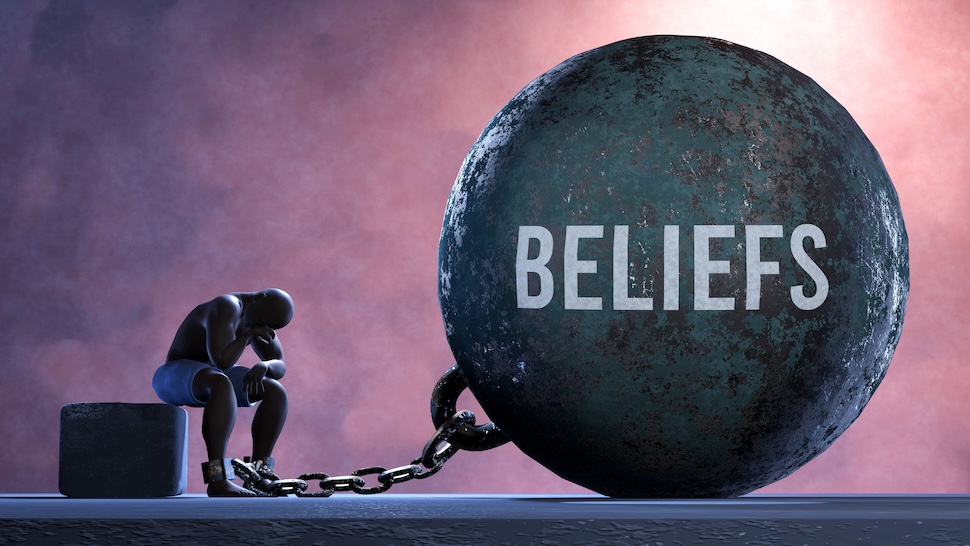
Change is an inevitable part of life, and embracing it can lead to profound transformation. The new year symbolizes a fresh start, a chance to reevaluate our path and make adjustments that align with our true desires. But to make room for new opportunities and growth, we must let go of things that hold us back. In this article, you will discover four important things to let go of in the new year for a truly transformative experience. (Estimated reading time: 9 minutes)
“It’s never too late—never too late to start over, never too late to be happy.”
— Jane Fonda
As we welcome the new year, many of us reflect on what we want to build, create, and bring to life. You might update your vision boards, jot down resolutions, and kick off new projects.
Like a runner poised at the starting line, you’re ready to dash into this fresh lap of 365 days at the first opportunity. We could run faster, smoother, and more efficiently if we shed some of the weight and baggage from our pasts. Releasing the things holding us back is essential to truly thriving in the new year and skyrocketing our growth.
As emotional creatures who often cling to the familiar, we can struggle to let go, even when it may not serve our best interests. However, change is an unavoidable aspect of life, and welcoming it can bring about significant transformation.
Many cultures and spiritual beliefs feature deities representing the life cycle, encompassing creation, preservation, and destruction. This archetype is deeply ingrained in the human consciousness.
In the ancient Egyptian pantheon, Isis, the goddess associated with magic and healing, represents this archetype, evolving through her profound wisdom and steadfast love. In Hindu tradition, she takes the form of Kali, the powerful representation of time and transformation, whose destructive dance clears the path for new beginnings. In Greek mythology, Persephone’s journey to and from the underworld symbolizes the perpetual cycle of life, death, and renewal.
While differing in name and story, a common theme unites these various transformation archetypes—their deep connection to the dynamics of change and their function as guides in the process of transformation. They represent the inherent ability within every person to overcome obstacles, let go of outdated parts of themselves, and emerge revitalized, like a phoenix rising from the ashes.
One key takeaway from these deities is recognizing that change, while intimidating, serves as a powerful catalyst for personal growth and self-exploration. To fully embrace change, it’s essential to shift your mindset. Rather than seeing it as something to fear, view it as a chance for growth and discovery. This outlook lets you greet the fresh start of a new year with zest and curiosity.
The importance of letting go

Releasing what no longer benefits us is a powerful step toward emotional freedom and growth. As sentimental beings, we hold onto the known, and letting go can feel intimidating, but in the long run, it will pay off, eventually opening room for fresh experiences, connections, and possibilities. We can grow into better versions of ourselves by eliminating negative feelings, outdated beliefs, or draining relationships.
Letting go brings a sense of freedom and builds resilience and adaptability. Life is ever-evolving, and those who accept change and release the past create space for the new. Recognizing the temporary nature of everything helps us develop a mindset that embraces change instead of fighting against it. We learn to appreciate the present while being open to what is yet to come.
Letting go is a vital part of self-care. When we free ourselves from the things that hold us back, we can better care for ourselves and improve our quality of life. This liberation creates a ripple effect, influencing our relationships, work, and overall outlook, paving the way for a more harmonious and fruitful life.
How can holding on to the past be harmful?
Letting go of the past can be challenging, and we can find ourselves caught in a cycle of negative feelings such as regret, bitterness, and resentment. These emotions can sap our energy, cloud our judgment, and prevent us from truly enjoying the present moment.
The heavy load of our pasts can impede our evolution and learning. We may end up stuck in familiar patterns, unable to escape the constraints of our pasts. This can lead to stagnation and dissatisfaction in our lives.
Living in the past can also have a detrimental impact on our relationships. When we struggle to let go of old grievances, forming deep and meaningful connections becomes challenging, often leading us to be more cautious and protective. This behavior can lead to feelings of loneliness and isolation. Additionally, the stress and anxiety from clinging to past experiences can have adverse effects on our physical and mental well-being, causing several health issues.
Three signs that it’s time to let go of in the new year and move on
Knowing the signs that it’s time to let go of something from the past is the first step toward starting afresh in the new year and tapping into the potential and promise it brings. These are the three classic signs that show that it’s time to let go and move on:
1. A constant stream of negative emotions, such as anger, resentment, or sadness, lingers and interferes with daily life.
2. A feeling of being stuck or stagnant, unable to move forward or progress in life. You may repeatedly revisit the same problems or patterns, unable to break free from old ways.
3. Repeatedly dwelling on past mistakes or failures, unable to let go of the shame or guilt associated with them. You’ll find that you’re unable to take risks, forgive yourself and others, and let go of insecurity and self-doubt.
How do you figure out what to let go of in the new year?

As the new year draws near, it’s natural to reflect on the past year’s experiences, challenges, and achievements. This reflection can be a valuable exercise to weed out what is not working and decide what to let go of in the new year.
- Obstacles: Consider the challenges you encountered in the year. Analyze what went wrong or didn’t work out as planned so that you can develop strategies to overcome similar obstacles in the future.
- Lessons: Reflect on what lessons you learned, the relationships you fostered, and the challenges you faced. Each moment, whether good or bad, contributes to the mosaic of your life, shaping who you are and who you aspire to be. Taking time to appreciate these experiences allows you to identify patterns and behaviors that may no longer serve your best interests.
- Accomplishments: To avoid being too hard on yourself, be sure to highlight your achievements. Even the smallest victories deserve celebration, as they can boost your confidence and inspire you for the upcoming year. Acknowledging your successes creates a positive outlook that can motivate you to achieve more in the new year and inspire you to let go of any dead weight.
Writing down your thoughts and emotions in a journal during this personal excavation can enhance its effects. It offers insight and acts as a tangible reminder of your experiences. Examining your past will prepare you to step into the new year with purpose and gratitude.
Four things to let go of in the new year
To make room for new opportunities and growth, home in on one of these four key areas. Releasing them will lead to a transformative experience that will change the trajectory of your life.
1. Negative relationships.
Negative relationships can significantly affect our mental and emotional health. These connections can drain our energy, whether they involve friends, romantic partners, or family members. The first step to freeing yourself is to identify the signs of a toxic relationship. If you often feel anxious, resentful, or sad after spending time with someone, it may be a sign that the relationship isn’t beneficial. Recognizing these emotions empowers you to make changes for a healthier life.
Releasing yourself from damaging relationships doesn’t mean severing ties abruptly. Instead, it can be a slow and gradual process where you establish boundaries and reduce your interactions with toxic influences. As you create that distance, make sure to invest time in positive relationships that encourage and motivate you. Surround yourself with those who support you and can enhance your perspective on life.
Letting go of toxic relationships is an act of self-love because it shows that you’re dedicated to putting your well-being and happiness first. While the process may be challenging, the rewards are transformative. You create space for genuine connections that foster growth, joy, and fulfillment.
2. Self-doubt and limiting beliefs.

Self-doubt and limiting beliefs are significant barriers that keep us from reaching our full potential. These internal narratives often arise from previous experiences, social pressures, or criticism from others. To move forward, it’s important to identify and address these limiting beliefs. Challenge negative thoughts and substitute them with positive affirmations that promote self-love and acceptance.
Getting rid of self-doubt requires a willingness to embrace vulnerability. This means acknowledging that it’s okay not to have all the answers and to make mistakes along the way. Every setback presents a chance to grow and learn. Reframing how you view failure can help cultivate resilience and a willingness to take risks. The more you embrace self-compassion, the easier it is to quiet that inner critic and replace it with a supportive inner dialogue.
Remember that overcoming self-doubt and limiting beliefs is a lifelong journey. It requires ongoing self-reflection and dedication to your betterment. Activities like journaling, meditation, or therapy can significantly support this journey. Surrounding yourself with positive influences and engaging in self-affirming activities can also reinforce a healthy self-image.
3. Clutter and physical possessions.
In our consumer-driven society, you may fall into the trap of accumulating physical possessions that no longer have a place in your life. Decluttering goes beyond simply organizing your space; it’s about creating an environment that promotes clarity, tranquility, and inspiration. Start by assessing your possessions and determining which ones add value. Consider whether each item brings you joy or fulfills a valuable function.
Clearing out clutter can feel liberating. As you remove things you no longer use, you might discover that it also opens emotional and mental space. A tidy space often helps lower stress levels and boost focus, enabling you to invest energy into more meaningful pursuits. Plus, giving away or donating items you don’t need can build a sense of community and kindness, significantly improving your emotional health.
Adopting a minimalist lifestyle can be beneficial in the long run. It promotes mindful consumption and helps you value what you already possess instead of always wanting more. By choosing minimalism, you can nurture a sense of gratitude and contentment.
4. Old habits and routines.
The new year is an ideal time to evaluate your habits and routines. While they can feel comfortable and familiar, they might not serve you in the long run. Transforming old habits takes both intention and commitment.
Take some time to think about your daily practices and pinpoint the ones that contribute positively to your life. You might discover that some habits no longer align with your goals or values. Think about replacing those outdated practices with healthier ones that support your goals.
For instance, if you notice binge-watching TV consuming too much of your time, try using that time to read or pursue a new hobby instead. Keep in mind that building new habits requires time and persistence. Stick with your new routine; eventually, it will feel more natural. Celebrate your small achievements, which can boost your motivation to pursue change.
Being part of a supportive community can also help reinforce your efforts. Connect with people who uplift and encourage you to grow and improve. Discuss your goals with them and ask for their support in holding you accountable.
The path to transformation requires releasing the desire to control everything. Life is unpredictable, and accepting this reality can lead to greater resilience and flexibility. By learning to navigate the ebb and flow of life, you can develop a deeper sense of trust in yourself and your ability to handle whatever comes your way.
As you open yourself up to new beginnings, you pave the way to life filled with endless possibilities and opportunities for growth that shine bright in the days ahead of you.
All my best on your journey,
Seline

Questions for you: What will you let go of in the new year? What do you hope to replace it with?
Did you like this post? Sign up below, and I’ll send you more awesome posts like this every week.

Have Your Say